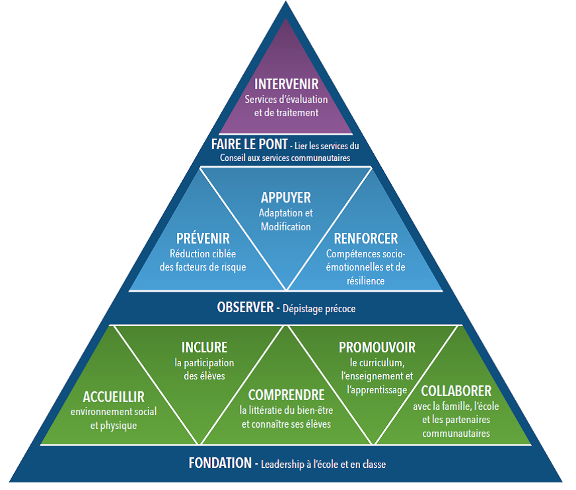Le bien-être et la santé mentale de notre communauté scolaire sont notre priorité, elles sont les conditions essentielles à l’apprentissage et à l’épanouissement des élèves.
Nous favorisons un modèle harmonisé et intégré pour le bien-être et la santé mentale des élèves. Une approche de soutien échelonnée est un moyen d’organiser les stratégies et initiatives pour assurer que celles-ci touchent tous les niveaux d’interventions dans chaque école et dans chaque classe.
Niveau 1 (vert) : Bon pour tous – Promotion de la santé mentale
Niveau 2 (bleu) : Nécessaire pour certains – interventions préventives
Niveau 3 (violet) : Essentiel pour quelques-uns – une thérapie plus intensive

Les écoles du CSDC des Aurores boréales font la promotion de la santé mentale et du bien-être auprès de leurs élèves de différentes façons. Elles emploient des stratégies universelles qui sont bénéfiques pour tous, comme :
- Des sessions d’habiletés sociales
- Le soutien au comportement positif
- Le climat scolaire positif
- L’apprentissage socio émotionnel
- La semaine de la santé mentale
- L’activité physique quotidienne
- Des programmes basés sur la recherche en salle de classe ; tel que Zones de Régulation
Les interventions au niveau 1 aident aux membres du personnel à connaître leurs élèves et à reconnaître les signes de détresse qui se manifestent chez certains d’entre eux. Ceci permet aux membres du personnel d’aiguiller les élèves en besoin vers des services du niveau 2 ou 3, tels que :
- Des programmes basés sur la recherche en petit groupe : tel que FRIENDS Résilience, Zone de Régulation, Nos enfants et le stress, etc.
- Plans de transition
- Analyse comportementale appliquée
- Renforcement positif individuel
- Groupes d’habiletés sociales
- Plan comportemental
- Plan d’intervention
- Plan de sécurité
- Thérapie avec un professionnel de la santé
C’est quoi la santé mentale?
(vidéo par Manuvie) :
Ressources
- Santé mentale en milieu scolaire Ontario Lien externe travaille en collaboration avec les conseils scolaires de l’Ontario pour favoriser la santé mentale des élèves. Vous y trouverez plusieurs ressources utiles.
- Le carrefour aux ressources en santé mentale des jeunes Lien externeaide les adolescents à prendre soin d’eux et des personnes qui les entourent pendant une période difficile.
- Ligne de crise régionale : nous avons tous vécu des situations difficiles. Il se passe quelque chose ou une chaîne d’événements se produit qui dépasse notre capacité à faire face. Il se peut que nous ayons fait appel à notre famille et à nos amis pour obtenir du soutien, que nous ayons surmonté la situation et que nous soyons allés de l’avant, ou que nous nous soyons retrouvés seuls et incapables de faire face à la situation.
Si vous vivez une telle situation ou vous ressentez le besoin de parler à quelqu’un, communiquer avec la ligne de crise, un service disponible pour tous les âges, 24 heures par jour, 7 jours par semaine : 1 866-888-8988
- Jeunesse, J’écoute Lien externe offre un service d’intervention professionnelle, d’information, de ressources et un service de soutien par texto aux jeunes en français et en anglais. Ce service est offert 24/7.
- Téléphoner 1-800-668-6868, texter PARLER au 686 868 ou clavarder en direct chez jeunessejecoute.ca Lien externe
- Parlons suicide Canada a été créée pour offrir un service équitable et accessible à quiconque a besoin de soutien, peu importe son lieu de résidence au Canada, 24 heures sur 24, 7/7.
- Faites le 9-8-8 par téléphone ou par texto.
Voici quelques situations susceptibles de déclencher une crise chez une personne :
- l’apparition ou la récurrence de symptômes liés à une maladie mentale ;
- des difficultés liées à la consommation d’alcool, de drogues ou d’autres substances ;
- des difficultés dans vos relations avec les autres ;
- un changement de vie important ou un événement traumatisant ;
- le sentiment d’être seul et isolé ;
- la perte du logement ;
- la perte d’un être cher et le deuil qui y est associé ;
- des pensées qui s’emballent et ne s’arrêtent pas ;
- des idées et des pensées suicidaires ou l’élaboration d’un plan concret pour mettre fin à votre vie.
Programmes et services offerts
Promotion de la santé mentale | Interventions préventives (universelles ou ciblées) | Interventions individuelles | Services de crise | |
|---|---|---|---|---|
Apprentissage socio-émotionnel – Santé mentale au quotidien Lien externe
| Zones de Régulation Friends Résilience Nos enfants et le stress Second Step | Counseling 1:1 Dilico 1 855 486-5037 ou en ligneLien externe Infirmières et infirmiers en santé mentale et en toxicomanie (référence en ligne Lien externe) Clinique de counselling sans rendez-vous – voir l’horaire et les détailsLien externe | Counselling 1:1 avec la TS de l’école (communiquer avec un membre du personnel ou faire une autoréférence pour accéder au service) | 24 heures par jour/7 jours par semaine
807-346-8282
|

